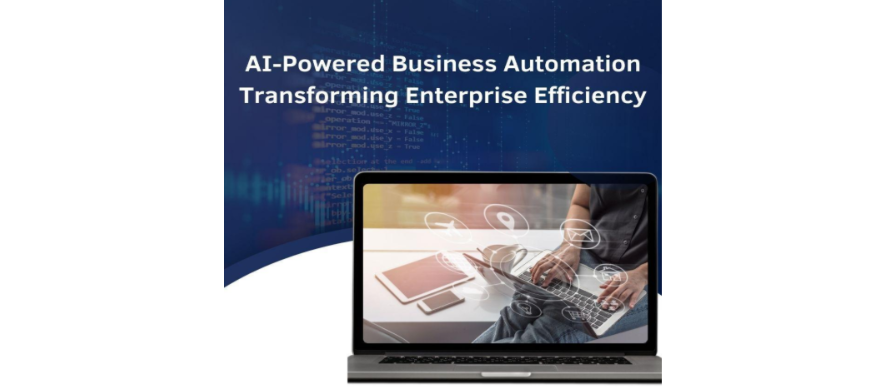In the age of innovation, the strategic integration of artificial intelligence (AI) with business process automation is redefining enterprise operations in the digital era. Sasikiran Vepanambattu Subramanyam, an expert in enterprise solutions, explores how AI-driven automation is enhancing decision-making, optimizing workflows, and unlocking new efficiencies. His insights offer a forward-looking perspective on the next-generation capabilities of AI-powered business systems.
The Shift from Rule-Based Systems to Intelligent Automation
Traditional business process systems depend on rigid, rule-based workflows, restricting flexibility. In contrast, AI-powered automation leverages machine learning to adapt dynamically by analyzing historical data. This shift enables enterprises to manage complex, variable scenarios with greater efficiency. Studies show that AI-driven automation improves exception handling by 87% and decision accuracy by 27%, surpassing conventional approaches. By continuously evolving, intelligent automation enhances responsiveness and precision, reducing reliance on static rules. As businesses face increasing operational complexity, AI-driven solutions offer a transformative edge, streamlining workflows, optimizing decision-making, and significantly boosting overall process efficiency in dynamic environments.
Predictive Capabilities: A Game Changer for Enterprise Operations
AI-driven predictive capabilities are revolutionizing enterprise operations by shifting management from reactive to proactive. By forecasting process deviations and operational risks, AI-powered analytics enhance decision-making and prevent disruptions. In manufacturing, predictive maintenance can anticipate equipment failures up to nine days in advance with 91% accuracy, significantly reducing downtime and improving efficiency. This foresight enables organizations to optimize resource allocation, streamline workflows, and mitigate potential bottlenecks before they occur. As a result, businesses enhance productivity, maintain operational resilience, and drive continuous improvements across processes. With AI’s predictive power, enterprises can make data-driven decisions that foster efficiency and long-term success.
Enhancing Data Processing Through Natural Language Understanding
Unstructured data—such as emails, documents, and customer communications—accounts for nearly 80% of enterprise information. AI-integrated automation leverages natural language processing (NLP) to extract meaningful insights from these data sources. This capability significantly improves workflows in areas like customer service, where AI can analyze queries, detect sentiment, and categorize requests, streamlining response times and improving customer satisfaction.
Intelligent Decision Support: Augmenting Human Expertise
AI augments human decision-making by providing data-driven recommendations, rather than replacing expertise. Unlike traditional rule-based systems, AI-powered models deliver consistent, unbiased evaluations, improving decision accuracy. Research indicates that AI-enhanced workflows match or surpass human judgment in 73% of cases, ensuring more reliable and scalable decision-making. By integrating AI, organizations benefit from increased efficiency, reduced errors, and improved outcomes, reinforcing human expertise with intelligent support for better strategic and operational decisions.
AI-Driven Process Optimization and Continuous Learning
AI-powered automation stands out for its self-learning capability, unlike static tools. These intelligent systems continuously refine processes based on real-time data, driving operational efficiency. Enterprises adopting AI-driven self-optimization report a 15% boost in key performance indicators, highlighting its transformative impact. By enabling continuous learning, AI enhances business automation, ensuring adaptability and sustained performance improvements in dynamic environments.
Ethical AI: Ensuring Transparency and Accountability
As AI systems take on greater decision-making responsibilities, ethical considerations become paramount. Organizations must implement frameworks to mitigate algorithmic bias, ensure transparency, and establish accountability. Explainable AI (XAI) techniques help make automated decisions more interpretable, increasing stakeholder trust and regulatory compliance. Regular audits and fairness constraints further ensure that AI models align with ethical business practices.
The Future of AI-Integrated Business Automation
The evolution of AI-powered business automation continues to drive innovations such as federated learning, which enables AI models to learn from decentralized datasets while preserving data privacy. Additionally, hybrid human-AI collaboration models are becoming more prevalent, ensuring that AI systems complement human expertise rather than replacing it entirely. These advancements will further shape enterprise efficiency, agility, and competitiveness.
In conclusion, the fusion of AI and business process automation is not merely an incremental improvement but a fundamental reimagination of enterprise operations. By leveraging AI’s predictive capabilities, natural language processing, and intelligent decision-making, organizations can drive unparalleled efficiency and agility. As businesses continue to adopt these technologies, those that integrate AI strategically will lead the next wave of digital transformation. Sasikiran Vepanambattu Subramanyam’s research highlights the need for enterprises to approach AI implementation holistically, ensuring both technological innovation and ethical governance for sustainable success.



































